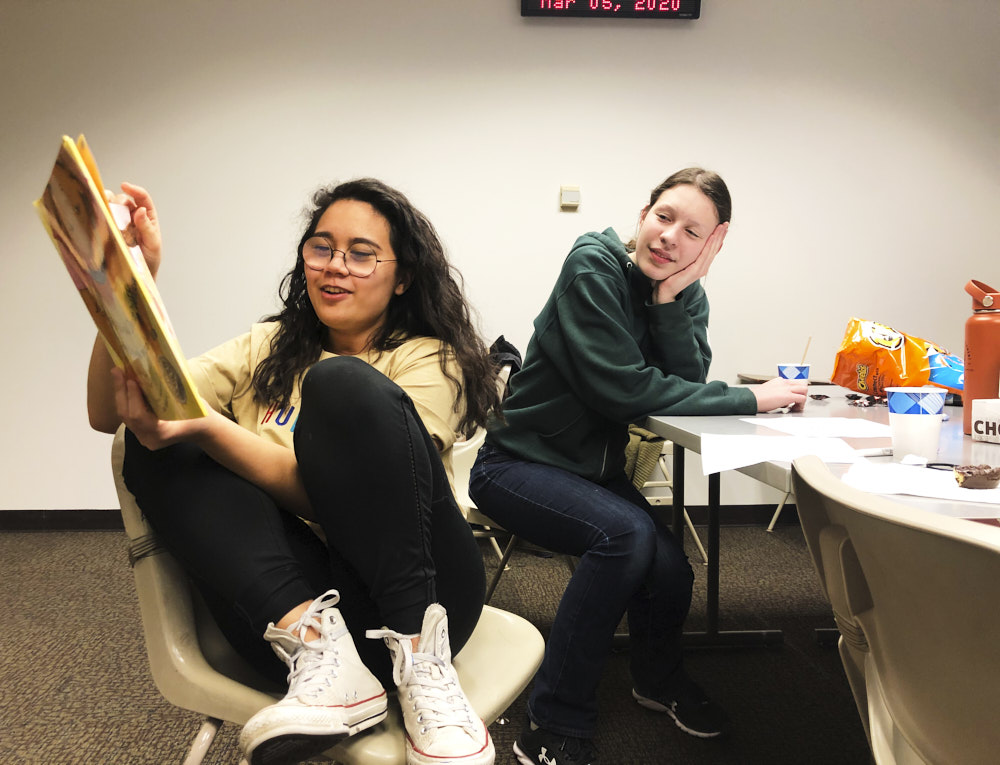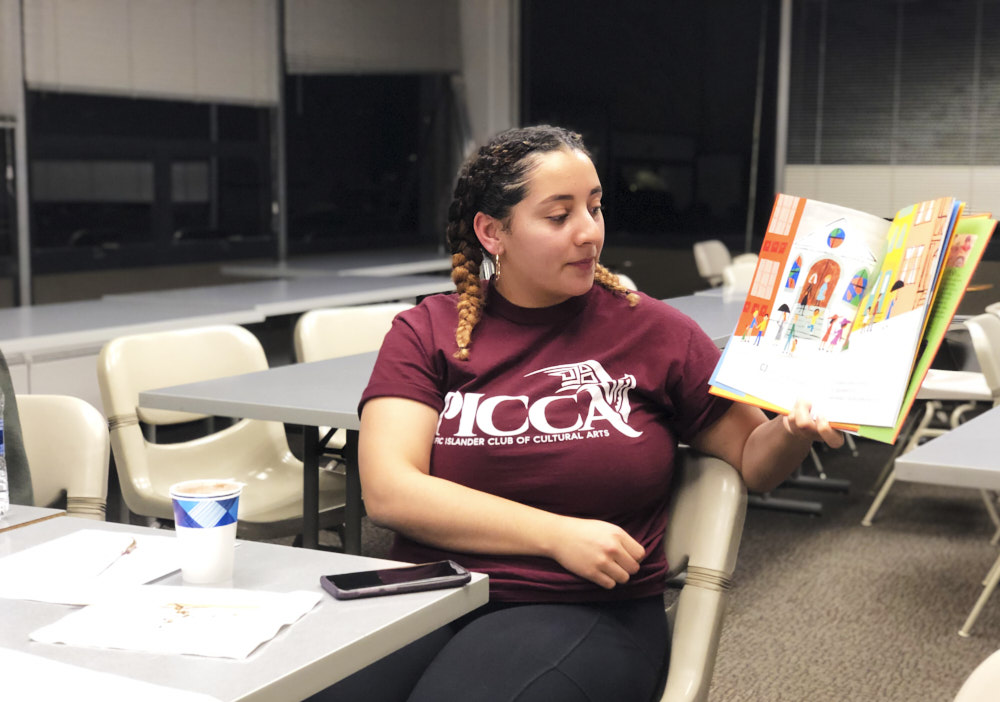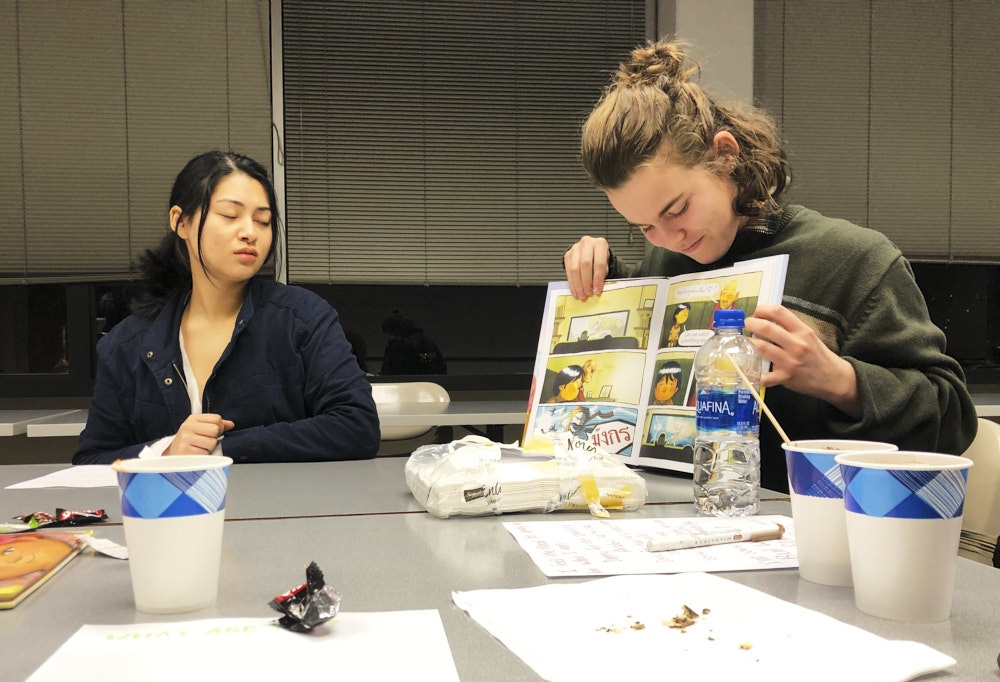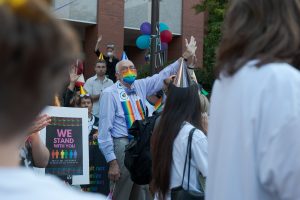Combatting feelings of exclusion among mixed students
Mixed Student Union opens space for mixed students who feel disconnected from their own
April 16, 2020

Sophomore Laur Lugos (left), co-president of Mixed Student Union, reads from a children’s book as Clarice Nicholas (right), a member, watches on during a March meeting.
As a new student on the Seattle Pacific University campus, sophomore Noha Elbahouty struggled to find a group into which she could fit with.
Although there are a few clubs that unify minority students like Black Student Union, which she became involved with later, Elbahouty felt excluded from the SPU campus. Elbahouty shared that she and her friends wanted to create a space in which mixed race and mixed culture students could feel accepted and understood.
Elbahouty said that she and her friend sophomore Laur Lugos founded the Mixed Student Union (MSU), formerly known as Culture Shock, last winter quarter when they realized mixed students were underrepresented on campus.
“It just felt like they [the clubs] didn’t showcase my identity … so while talking to my co-president Laur, we had a conversation like ‘why isn’t this a space on campus?’ and it shifted to ‘how can we make this a space?’” Elbahouty said.
Elbahouty and Lugos created the club to ensure mixed race students would have a place to feel accepted on campus.
“We just want a space where we can come together and talk to each other, and find comfort in the fact that we understand each other’s experiences,” Elbahouty said.
“But also, open it up for people to learn what it is really like to be mixed because it’s not really talked about in common media.”
Each meeting is centered around a specific theme or topic for discussion.

Sophomore Noha Elbahouty, a co-president for Mixed Student Union, reads from “The Last Stop on Market Street” during a meeting on March 5.
At one of the club’s meetings they discussed imposter syndrome, or the feeling that an individual is out of place in the community of their “people,” or ethnic background. Elbahouty explained that this is one of the biggest struggles in the mixed community as they try to figure out their identities and where they fit in.
The MSU leaders take pride in the open discussions that happen during their meetings.
Rebekah Huber, a sophomore and fellow MSU officer shared that the club’s focus is dialogue-based and has fostered many important conversations.
Elbahouty shared a similar statement, saying that the club has allowed its members to relate to one another and educate those who are willing to learn.
“It’s very personal, we try to add teaching moments when we can, but it’s very much a place for people to come and share their experiences and relate to other people,” Elbahouty said.
While some meetings can introduce heavy topics of discussion, Elbahouty explained that the club also has more relaxed meetings as well.
The relationships Elbahouty has created through the group have been extremely important to her.
“I think interacting with people and realizing I’m not alone has been a highlight. It’s hard on campus, especially when you don’t really know anyone … Now, I feel like I’ve found my people and I’m hoping to create that space for others to find their people too,” she said.
Elbahouty explained that the club also works to create a space in which students can learn about cultural differences, issues and experiences within the mixed community, and how to be more supportive of this community on and off campus.

Sophomore Rebekah Huber reads from the book “Drawn Together” by Minh Le, a story about a grandson and his grandpa connecting across cultural boundaries through art.
Huber was enthusiastic about getting involved in MSU because she and the founders had similar ideas about connecting students of mixed identities.
Huber shared that she herself is a person with a mixed culture background, sharing that her parents often travelled around the world for their work as she was growing up.
“Growing up overseas, I experienced a lot of different cultures that influenced my identity, there are many other students who can relate to this so we wanted to also create a space for third culture kids on campus,” she said.
Huber also shared why she believes MSU provides such a crucial environment for both students of mixed race identities, and different cultural backgrounds.
“I think that there aren’t a lot of spaces on campus for mixed students being able to exist without having to explain themselves. I see that having a place where people can be themselves without having to answer why they don’t ‘fit’ into someone’s box is super valuable,” she said.
Mixed Student Union is open to all students. With the school’s transition to remote learning, the club has not planned any meetings hosted online yet, but will continue to stay connected with the SPU community via their instagram @spu_msu.

























































































